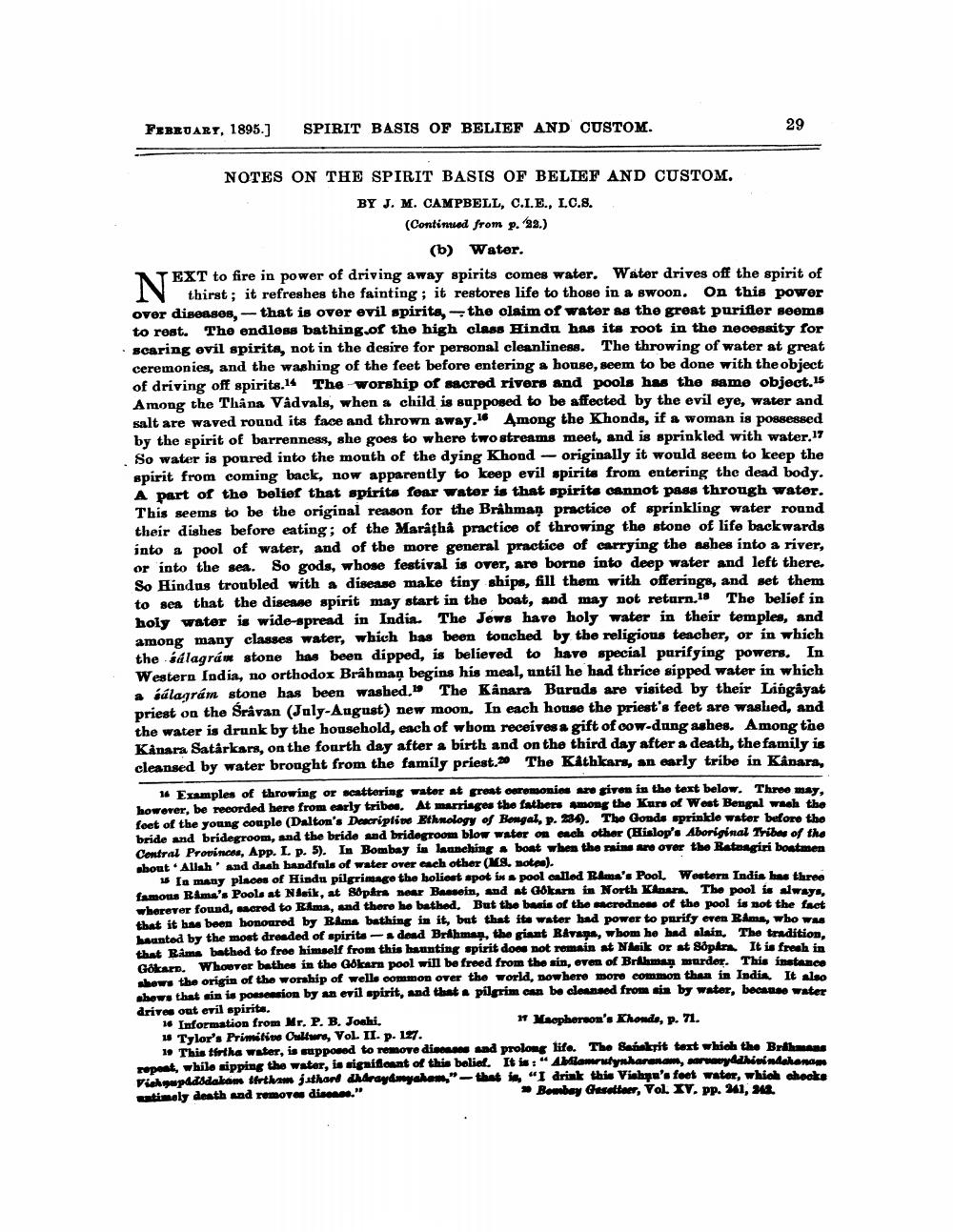________________
FEBRUARY, 1895.)
SPIRIT BASIS OF BELIEF AND CUSTOM.
29
NOTES ON THE SPIRIT BASIS OF BELIEF AND CUSTOM.
BY J. M. CAMPBELL, C.I.E., LC.8.
(Continued from p. 192.)
(b) Water. N EXT to fire in power of driving away spirits comes water. Water drives off the spirit of
I thirst; it refreshes the fainting; it restores life to those in a swoon. On this power over diseases, - that is over evil spirits, the claim of water as the great purifler seems to rest. The endless bathing of the high class Hindu has its root in the necessity for scaring ovil spirits, not in the desire for personal cleanliness. The throwing of water at great ceremonies, and the washing of the feet before entering a house, seem to be done with the object of driving off spirits.14 The worship of sacred rivers and pools has the same object.is Among the Thana Vâdvals, when a child is supposed to be affected by the evil eye, water and salt are waved round its face and thrown away. Among the Khonds, if a woman is possessed by the spirit of barrenness, she goes to where two streams meet, and is sprinkled with water.17 So water is poured into the mouth of the dying Khond - originally it would seem to keep the spirit from coming back, now apparently to keep evil spirits from entering the dead body. A part of the belief that spirits fear water is that spirits cannot pass through water. This seems to be the original reason for the Brahman practice of sprinkling water round their dishes before eating; of the Marâțhå practice of throwing the stone of life backwards into a pool of water, and of the more general practice of carrying the ashes into a river, or into the sea. So gods, whose festival is over, are borne into deep water and left there. S. Findus troubled with a disease make tiny ships, fill them with offerings, and set them to sen that the disease spirit may start in the boat, and may not return.18 The belief in holy water is wide-apread in India. The Jews have holy water in their temples, and among many classes water, which has been touched by the religious teacher, or in which the sálagrár stone has been dipped, is believed to have special purifying powers. In Western India, no orthodox Brahmaq begins his meal, until he had thrice sipped water in which a sálagrám stone has been wasbed. The Kânara Buruds are visited by their Lingayat priest on the Sravan (July-August) new moon. In each house the priest's feet are waslied, and the water is drunk by the household, each of wbom receives a gift of cow-dang ashes. Among the Kånara Satarkars, on the fourth day after a birth and on the third day after a death, the family is cleansed by water brought from the family priest.20 The Kithkars, an early tribe in Kanara,
14 Examples of throwing or scattering water at great ceremonies are given in the text below. Three may. however, be recorded here from early tribes. At marriages the fathers among the Kurs of West Bengal wash the foet of the young couple (Dalton's Descriptive Ethnology of Bengal, p. 23-4). The Gonds sprinkle water before the bride and bridegroom, and the bride and bridegroom blow water on each other (Hislop's Aboriginal Tribes of the Central Provinces, App. I. p. 5). In Bombay in launching boat when the main are over the Ratnagiri bontmen about. Allah and desh bandfuls of water over each other (MS. motae).
15 Ia many places of Hindu pilgrimage the holiest spot in pool called Rama's Pool, Western India has three famous Råme's Pools at Nisik, at Sopirs near Bassein, and at Gokar in North Klan. The pool is always, wherever found, wered to Rima, and there he bathed, But the basis of the macrodness of the pool is not the fact that it has been honoured by Bams bathing in it, but that its water had power to purify even Rams, who was haunted by the most dreaded of spirito dend Brahman, the giant Rivage, whom he had slain. The tradition. that Rams bathed to free himself from this haunting spirit does not remain at Naik or at Sopina It is fresh in Gökarp. Whouver bathes in the Gokarn pool will be freed from the sin, even of Brahman murder. This instance shows the origin of the worship of wells common over the world, nowhere more common than in India. It also shows that sin is possession by an evil spirit, and that pilgrim can be cleansed from six by water, because water drives out evil spirite. 16 Information from Mr. P. B. Joshi.
1 Macpherson's Khonds, p. 71. 16 Tylor's Primitius Culture, VoL II. p. 127.
29 This tirtha water, is supposed to remove discs and prolong life. The Rahokrit text which the Brims repeat, while sipping the water, is significant of this belied. It is : " bilamrutyaharanam, r ydhindehands Vichyupddddakam thrth jathan Ihraydinyahan," - that in "I drink this Vishpo's feet water, whiol shooks timely death and remove dien."
* Bombay Gresatteer, Vol. IV. pp. 21, M2




